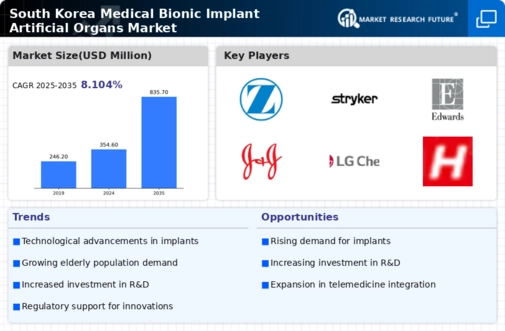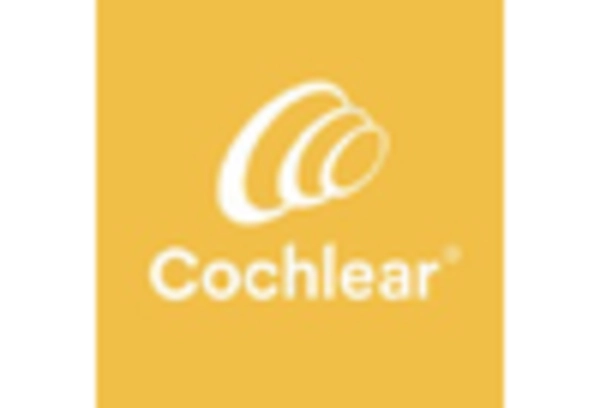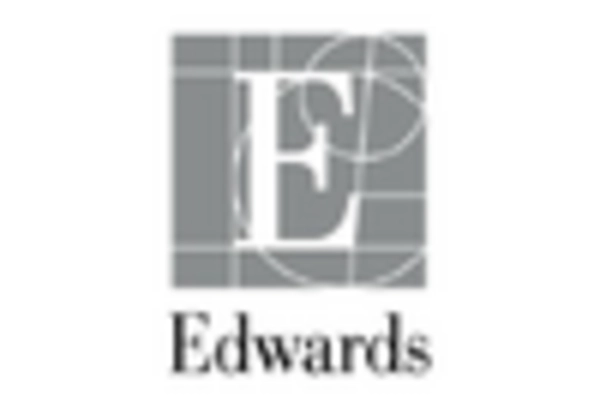Rising Aging Population
The increasing aging population in South Korea is a pivotal driver for the medical bionic-implant-artificial-organs market. As life expectancy rises, the prevalence of age-related health issues, such as organ failure, escalates. This demographic shift necessitates innovative medical solutions, including bionic implants and artificial organs, to enhance the quality of life for elderly patients. According to recent statistics, approximately 15% of South Korea's population is aged 65 and older, a figure projected to rise significantly in the coming years. This trend indicates a growing market for advanced medical technologies that can address the unique health challenges faced by older adults, thereby propelling the demand for medical bionic-implant-artificial-organs market solutions.
Increased Healthcare Expenditure
The rise in healthcare expenditure in South Korea is a significant driver for the medical bionic-implant-artificial-organs market. With the government and private sectors investing heavily in healthcare infrastructure, spending has increased by over 7% annually. This financial commitment allows for the adoption of advanced medical technologies, including bionic implants and artificial organs. As healthcare budgets expand, hospitals and clinics are more likely to invest in innovative solutions that enhance patient care. This trend suggests a robust growth trajectory for the medical bionic-implant-artificial-organs market, as healthcare providers seek to improve treatment options and outcomes for patients with severe medical conditions.
Supportive Regulatory Environment
A supportive regulatory environment in South Korea is fostering growth in the medical bionic-implant-artificial-organs market. The government has implemented streamlined approval processes for medical devices, which encourages innovation and expedites the introduction of new products. Regulatory bodies are actively collaborating with manufacturers to ensure that bionic implants and artificial organs meet safety and efficacy standards. This proactive approach not only enhances consumer confidence but also stimulates investment in research and development. As a result, the medical bionic-implant-artificial-organs market is likely to experience accelerated growth, as companies are motivated to bring their innovative solutions to market more efficiently.
Technological Innovations in Healthcare
Technological advancements in healthcare are transforming the medical bionic-implant-artificial-organs market. Innovations such as 3D printing, biocompatible materials, and advanced robotics are enabling the development of more effective and personalized bionic implants. In South Korea, the healthcare sector has seen substantial investments in research and development, with funding reaching approximately $1 billion in recent years. These investments facilitate the creation of cutting-edge solutions that improve patient outcomes and reduce recovery times. As technology continues to evolve, the medical bionic-implant-artificial-organs market is likely to expand, driven by the demand for sophisticated and efficient medical devices that can seamlessly integrate with human physiology.
Growing Awareness of Advanced Medical Solutions
There is a growing awareness among healthcare professionals and patients regarding the benefits of advanced medical solutions, which is driving the medical bionic-implant-artificial-organs market. Educational initiatives and outreach programs have increased understanding of how bionic implants can improve quality of life and extend longevity. In South Korea, public health campaigns have highlighted the potential of artificial organs in treating chronic diseases, leading to a shift in patient preferences towards these innovative solutions. This heightened awareness is likely to result in increased demand for medical bionic-implant-artificial-organs market products, as patients become more proactive in seeking advanced treatment options.

















